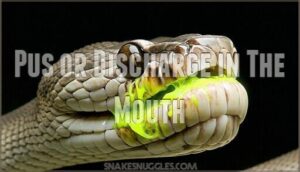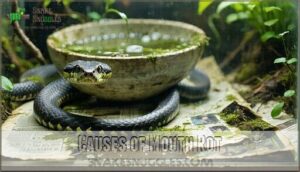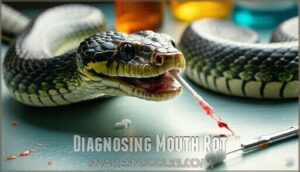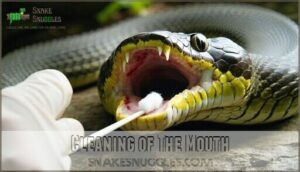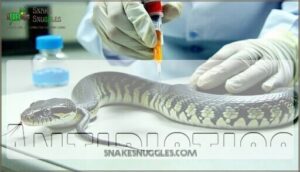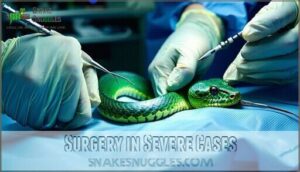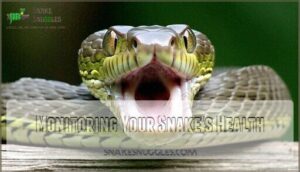This site is supported by our readers. We may earn a commission, at no cost to you, if you purchase through links.
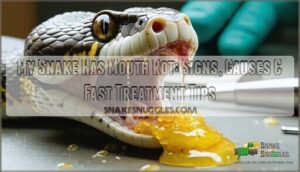
You’ll notice bloody saliva, swollen gums, pus-filled discharge, and your snake refusing food.
This condition stems from poor husbandry—inadequate temperatures, humidity, or dirty enclosures—that weakens your pet’s immune system.
Don’t wait or try home remedies; mouth rot can spread quickly and become life-threatening.
Your vet will clean the infection, prescribe antibiotics, and may need surgery in severe cases.
The good news? With proper treatment and improved care conditions, most snakes recover completely—but timing makes all the difference.
Table Of Contents
- Key Takeaways
- Understanding Mouth Rot in Snakes
- Signs and Symptoms of Mouth Rot
- Causes of Mouth Rot
- Diagnosing Mouth Rot
- Seeking Veterinary Treatment for Mouth Rot
- Preventing Mouth Rot in Snakes
- Monitoring Your Snake’s Health
- Consulting a Veterinarian for Concerns
- Frequently Asked Questions (FAQs)
- How do you treat mouth rot in snakes?
- How can mouth rot be treated?
- What does mouth rot look like on snakes?
- Is mouth rot contagious to other snakes?
- Can mouth rot be treated at home?
- How do you treat snake rot?
- How fast does mouth rot happen?
- What are the long-term health risks of mouth rot?
- How long does it take for mouth rot to develop?
- Are there any home remedies for mouth rot?
- Conclusion
Key Takeaways
- You’ll need immediate veterinary care – mouth rot is a serious bacterial infection that can’t be treated at home and requires professional antibiotics, cleaning, and sometimes surgery to prevent life-threatening complications.
- Watch for red flags like bloody saliva and loss of appetite – early symptoms include swollen gums, pus discharge, refusal to eat, and foul odors that signal your snake’s mouth is infected.
- Poor husbandry is usually the root cause – inadequate temperatures, humidity, dirty enclosures, and stress weaken your snake’s immune system, making bacterial infections more likely to take hold.
- Prevention beats treatment every time – maintain clean enclosures, proper temperatures and humidity, use appropriate prey sizes, and schedule regular vet checkups to catch problems before they become serious.
Understanding Mouth Rot in Snakes
When dealing with snake mouth rot, you’re looking at a serious bacterial infection that demands immediate attention.
Snake stomatitis develops when harmful bacteria colonize your pet’s oral cavity, creating painful inflammation and potentially life-threatening complications.
This infection typically signals underlying problems like poor husbandry or a weakened immune system.
Disease progression can advance rapidly through different rot stages, starting with mild redness and escalating to severe tissue damage.
Understanding these long-term effects helps you recognize early warning signs and seek prompt snake mouth rot treatment before the condition becomes critical.
Signs and Symptoms of Mouth Rot
Recognizing mouth rot symptoms early can save your snake’s life and prevent serious complications. You’ll notice several telltale signs that indicate your pet needs immediate veterinary attention.
Decreased Interest in Food
When your snake starts turning away from meals, it’s often signaling that snake mouth rot is causing loss of appetite and difficulty eating.
A loss of appetite in snakes often signals painful mouth infections that make eating unbearable.
This feeding reluctance stems from pain and inflammation making snake nutrition challenging.
- Complete refusal of previously accepted prey items
- Prey size preferences shifting to smaller options
- Increased time between feeding attempts
- Visible hesitation during snake feeding sessions
Nutritional deficiencies can worsen the condition, though force feeding and appetite stimulants should only be veterinarian-administered.
Dietary variety becomes essential once treatment begins.
Redness or Swelling in The Mouth
Visual mouth inspection reveals inflammation severity through distinct warning signs.
Redness appears as abnormal coloration around oral tissues, while swelling causes noticeable tissue enlargement.
Early detection through regular oral examination helps identify these mouth rot symptoms before serious tissue damage occurs.
| Inflammation Severity | Visual Signs | Location |
|---|---|---|
| Mild | Light redness, minimal swelling | Gum line, inner lips |
| Moderate | Bright red tissue, obvious swelling | Entire mouth cavity |
| Severe | Deep red inflammation, significant swelling | Throughout oral area |
Understanding swelling causes helps you recognize when your snake’s swollen mouth indicates snake mouth inflammation requiring immediate veterinary attention.
Blood in The Mouth or Bloody Saliva
Blood in your snake’s mouth signals serious trouble that demands immediate attention.
Blood in your snake’s mouth means emergency vet care is needed now.
Fresh red blood or pink-tinged saliva indicates active bleeding from damaged oral tissues.
Blood appearance varies from bright red spots to dark clots, while saliva consistency becomes thicker and discolored.
Bleeding severity ranges from minor hemorrhages to continuous flow, creating potential complications like anemia or systemic infection.
Diagnostic tests help veterinarians assess the extent of mouth discharge and determine appropriate treatment for snake mouth rot symptoms.
Unsanitary conditions can lead to bacterial buildup contributing to this condition, which may result in systemic infection and require immediate veterinarian attention.
Pus or Discharge in The Mouth
When you spot thick, creamy discharge or pus around your snake’s mouth, you’re looking at a clear sign of snake mouth rot.
This infected snake mouth material often appears yellowish or greenish with a foul odor.
The drainage location typically concentrates near the gum line, indicating infection severity that requires immediate treatment options from your veterinarian.
Causes of Mouth Rot
Understanding what causes mouth rot in your snake helps you prevent this painful condition and catch it early.
Several factors can trigger this bacterial or fungal infection, ranging from poor care conditions to underlying health problems.
Poor Husbandry
Inadequate snake enclosure maintenance creates the perfect breeding ground for snake mouth rot.
Poor husbandry practices, including unsanitary housing conditions, improper temperature gradients, and insufficient humidity control, weaken your snake’s natural defenses against bacterial infections.
Here are five critical husbandry factors that contribute to mouth rot:
- Enclosure cleanliness – Dirty water bowls and accumulated waste harbor harmful bacteria
- Temperature gradients – Incorrect heating zones compromise immune function and digestion
- Humidity control – Poor moisture levels stress respiratory systems and skin health
- Appropriate substrate – Wrong bedding materials retain moisture and promote bacterial growth
- Stress reduction – Overcrowding and improper handling weaken snake hygiene and overall health
Maintaining a clean habitat requires the use of effective cleaning supplies.
Compromised Immune System
A compromised immune system leaves your snake vulnerable to snake mouth rot and other snake health risks.
Stress reduction, proper nutrition, and addressing parasite impact strengthen your snake’s immune system.
Nutritional deficiencies and poor environmental factors weaken immunity, while genetic predisposition affects some snakes’ natural resistance to snake disease risks.
Supplementation can address essential snake nutrients that may be lacking in their diet.
Viruses and Injuries
Viral involvement and mouth trauma substantially increase your snake’s mouth rot risk.
Viruses like IBD weaken immune defenses, while cage trauma creates bacterial entry points. Consider specialized products for treatment to aid in the healing process.
Here are five key viral and injury factors:
- Viral Involvement – IBD and herpesviruses suppress immunity, enabling bacterial infections
- Bite Wounds – Prey bites introduce harmful bacteria directly into mouth tissues
- Cage Trauma – Sharp edges or rough surfaces cause mouth abrasions and scale damage
- Snake Wounds – Any mouth trauma from handling or enclosure hazards increases infection risk
- Injury Progression – Physical damage creates perfect conditions for snake mouth rot development
Underlying Health Conditions
Beyond injuries, existing health problems can leave your snake vulnerable to mouth rot.
When underlying health conditions compromise your snake’s immune system health, bacterial infections find an easy target.
Coexisting diseases create a domino effect – parasitic infections drain energy, nutritional deficiencies weaken defenses, and systemic illnesses overwhelm the snake immune system.
Some snakes inherit a genetic predisposition to immune suppression.
| Health Condition | Impact on Immunity |
|---|---|
| Parasitic Infections | Drains energy and nutrients |
| Nutritional Deficiencies | Weakens natural defenses |
| Systemic Illnesses | Overwhelms immune response |
| Genetic Factors | Inherited immune weakness |
Diagnosing Mouth Rot
When you suspect your snake has mouth rot, getting a proper diagnosis from a reptile veterinarian becomes essential for effective treatment.
A vet will examine your snake’s mouth closely and may take samples to identify the specific bacteria causing the infection.
Veterinary Examination
When you suspect mouth rot, a reptile veterinarian will conduct a thorough snake physical examination.
The process involves three key steps:
- History review – Your vet will ask about your snake’s environment, diet, and recent behavior changes
- Physical assessment – They’ll examine your snake’s mouth, looking for inflammation, discharge, or tissue damage
- Sample analysis – Mouth swabs may be collected for laboratory analysis to identify specific bacteria
Additional diagnostics like snake X-rays help evaluate bone involvement, while fecal testing checks for underlying parasites that could compromise immunity.
This thorough snake veterinary diagnosis guarantees accurate treatment planning.
Observation of Signs
During your oral examination, watch for early symptoms like redness, swelling, or discharge around your snake’s mouth.
Look for behavioral changes such as reluctance to eat or open-mouth breathing.
Clinical signs include visible lesions, skin abnormalities near the mouth area, and unusual breathing difficulty.
Document what you observe—these symptoms of mouth rot help your vet make an accurate diagnosis and treatment plan.
Swabs for Bacterial Culture
Your vet will collect swabs from your snake’s mouth to perform bacterial culture and cytology for diagnosing mouth rot.
This laboratory analysis pinpoints the specific bacteria causing infection through precise swab technique and sample handling.
Identifying pathogens helps determine:
- Culture accuracy for targeted treatment selection
- Antibiotic sensitivity testing for effective medications
- Ruling out fungal infections or other conditions.
This testing guarantees your snake receives the right treatment instead of guessing.
A clinical examination can help identify the severity of the condition.
Seeking Veterinary Treatment for Mouth Rot
Once you’ve confirmed your snake has mouth rot, professional veterinary treatment becomes essential for recovery.
Your vet will create a targeted treatment plan that addresses both the infection and any underlying health issues contributing to the condition.
Cleaning of The Mouth
Your vet will thoroughly clean your snake’s infected mouth using antiseptic solutions to remove bacteria and debris.
This debridement process removes dead tissue and pus buildup that’s fueling the infection.
Cleaning frequency depends on severity—mild cases may need daily attention while severe infections require multiple sessions.
Medicated solutions and topical creams follow the initial cleaning to promote healing and prevent reinfection.
Antibiotics
After thorough mouth cleaning, your vet will prescribe antibiotics to combat the bacterial infection causing your snake’s mouth rot. These medications form the backbone of effective snake antibiotic treatment, targeting harmful bacteria while promoting healing.
Your veterinarian will select the most appropriate snake treatment options based on several factors:
- Administration Methods – Antibiotics can be given orally, through injection, or applied topically depending on infection severity and your snake’s condition.
- Dosage Calculation – Proper dosing considers your snake’s weight, species, and overall health status to maximize effectiveness without harm.
- Side Effects – Monitor for digestive upset, lethargy, or unusual behavior during snake infection treatment, and contact your vet immediately if concerns arise.
- Antibiotic Resistance – Complete the full prescribed course even if symptoms improve to prevent resistant bacterial strains from developing.
Some cases may require Antibiotic Alternatives if standard treatments prove ineffective. Your vet might recommend combination therapies or specialized medications based on bacterial culture results, making certain your snake receives the most targeted care possible.
Pain Relief
Why does your snake need pain relief during mouth rot treatment? Because this infection creates significant discomfort that can worsen their condition.
Your vet will explain administration methods and monitor for side effects during snake pain management. Veterinary treatment typically includes analgesic options like meloxicam, administered through injection or oral methods following strict dosage guidelines.
Proper pain relief helps your snake heal faster and reduces stress during recovery, making home care more effective.
Surgery in Severe Cases
When surgery becomes unavoidable for severe mouth rot cases, your vet will perform debridement techniques to remove dead tissue under anesthesia.
While anesthesia risks exist for compromised reptiles, surgical intervention dramatically improves prognosis when antibiotics fail.
Post-op care requires sterile environments and pain management.
Bone involvement may necessitate reconstructive surgery for complete recovery.
Preventing Mouth Rot in Snakes
Why risk your snake’s health when simple prevention works better than treatment? Snake mouth rot prevention starts with consistent care practices that address the root causes before problems develop.
Prevention requires attention to these key areas:
- Enclosure Sanitation: Clean substrates weekly and disinfect surfaces monthly to reduce bacterial load by 70%
- Prey Selection: Use pre-killed, appropriately sized prey to prevent mouth injuries during feeding
- Stress Reduction: Provide adequate hiding spaces and limit handling to strengthen immune function
- Regular Checkups: Schedule annual veterinary visits for early detection and professional guidance
- Hydration Practices: Maintain clean water bowls and proper humidity levels for healthy mucosal membranes
These snake care tips create an environment where mouth rot can’t easily take hold. Maintaining proper humidity can also prevent bacterial and fungal growth.
Monitoring Your Snake’s Health
Regular checkups are your best defense against snake mouth rot and other health issues.
You’ll want to observe your snake’s general behaviour patterns weekly, watching for appetite changes, energy levels, and shedding observation cycles.
| Health Aspect | Normal Signs | Warning Signs |
|---|---|---|
| Mouth/Eyes | Clear, bright eyes; clean nostrils | Discharge, swelling, odor |
| Behavior Changes | Active, alert responses | Lethargy, aggression, hiding |
| Weight Tracking | Stable body condition | Visible spine, rapid loss |
| Hydration Levels | Smooth skin, regular drinking | Wrinkled skin, dehydration |
Monitor snake oral health by checking for discharge or unusual odors. A key aspect involves maintaining proper humidity to prevent respiratory infections.
Keep detailed records of feeding responses, shedding frequency, and any snake disease symptoms. This proactive snake health monitoring approach helps you catch problems early, before they become serious infections requiring intensive treatment.
Consulting a Veterinarian for Concerns
While regular monitoring helps catch issues early, knowing when to seek professional veterinary care can make all the difference in your snake’s recovery. Finding the right reptile veterinarian and preparing for appointments guarantees your pet gets the best possible care.
Build a relationship with a qualified reptile vet before emergencies arise. Schedule routine checkups and don’t hesitate to call when you notice concerning symptoms. Proper Vet Appointment Prep includes documenting symptoms, noting behavioral changes, and bringing clear photos of mouth issues.
Watch for these Emergency Signs that require immediate veterinary care:
- Difficulty breathing or open-mouth breathing
- Severe swelling that prevents mouth closure
- Blood pooling in water bowls
- Complete refusal to eat for extended periods
- Foul odor with visible tissue death
During consultations, discuss Cost Considerations upfront and ask about payment plans if needed. Your veterinarian may recommend Specialist Referrals for complex cases requiring advanced treatment. Follow Post-Visit Care instructions carefully, including medication schedules and environmental adjustments. Quality snake vet care and consulting veterinarian guidance are investments in your pet’s long-term health and wellbeing, providing the best possible recovery and wellbeing.
Frequently Asked Questions (FAQs)
How do you treat mouth rot in snakes?
Notably, when bacteria strike your snake’s mouth, you’ll need immediate veterinary care.
Your vet will clean infected tissue, prescribe antibiotics, and provide pain relief.
Severe cases require surgery under anesthesia for proper healing.
How can mouth rot be treated?
You’ll need a reptile vet for proper treatment. They’ll prescribe antibiotics, clean infected tissue, and may recommend medicated mouth rinses. Severe cases require surgical debridement under anesthesia.
What does mouth rot look like on snakes?
You’ll spot red, swollen gums with bloody discharge or pus around your snake’s mouth. The tissue looks inflamed with blister-like lesions, and there’s often a foul smell from bacterial infection.
Is mouth rot contagious to other snakes?
While frightening to witness, mouth rot isn’t directly contagious between snakes.
However, shared unsanitary conditions, stress factors, or contaminated equipment can spread the underlying bacteria that cause infections in multiple animals.
Can mouth rot be treated at home?
You shouldn’t treat mouth rot at home. This serious bacterial infection requires professional veterinary care for proper diagnosis, antibiotics, surgical cleaning, and pain management to prevent fatal complications.
How do you treat snake rot?
While home remedies seem tempting, snake mouth rot requires professional veterinary treatment.
You’ll need systemic antibiotics, surgical debridement of infected tissue, and proper pain management under veterinary supervision for successful recovery.
How fast does mouth rot happen?
Mouth rot develops gradually over days to weeks, not overnight. You’ll notice early signs like redness and swelling first, then discharge and appetite loss as the infection progresses and spreads.
What are the long-term health risks of mouth rot?
Without proper treatment, your snake’s mouth rot can escalate dangerously.
You’re facing potential bone infections, systemic sepsis, permanent jaw deformity, tooth loss, and even death if the infection spreads throughout the body.
How long does it take for mouth rot to develop?
Development time varies substantially based on your snake’s immune system and environmental conditions.
Mouth rot can progress from initial infection to visible symptoms within days to weeks, depending on underlying stress factors and bacterial load.
Are there any home remedies for mouth rot?
Playing with fire rarely ends well when treating serious infections—mouth rot needs professional veterinary care, not home remedies.
DIY treatments can worsen the condition and delay proper antibiotic therapy your snake desperately needs.
Conclusion
Recovery starts with recognizing that your snake has mouth rot and taking swift action.
Time becomes your most valuable ally when dealing with this bacterial infection. Without proper veterinary intervention, what begins as redness and swelling can quickly escalate into a life-threatening condition.
Your veterinarian will provide the antibiotics and professional cleaning needed for healing. Combined with improved husbandry practices, most snakes make complete recoveries when treatment begins early.
This approach ensures that your snake receives the necessary care to combat the infection, which is a bacterial condition.
- https://www.vin.com/vetzinsight/default.aspx?pId=756&catId=5892&id=8742164
- https://www.petplace.com/article/reptiles/general/mouth-rot-infectious-stomatitis-ulcerative-stomatitis
- https://petengineers.com/how-to-diagnose-and-prevent-crested-gecko-mouth-rot/
- https://arav.org/
- https://www.merckvetmanual.com/exotic-and-laboratory-animals/reptiles/bacterial-diseases-of-reptiles?query=stomatitis




